THC Effects On Your Brain and Nervous System
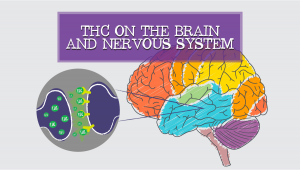
- 1. What is the central nervous system?
- 2. The effects of cannabinoids on cns function
- 3. Dangerous effects of cannabis on the cns
- 4. In conclusion
There’s a lot of documentation regarding the effects of cannabis, with several of the studies being conducted on humans but a lot of this research is considered inadequate due to the little information about cannabis that was available at that time. However, most recent research has found the specific receptors in the brain that recognize cannabinoids. So, based on the recent research we are able to know the favorable and unfavorable effects on the central nervous system, so read along for more information!
1. What Is The Central Nervous System?
The central nervous system (aka CNS) consists of the brain and spinal cord and has been studied for a long time by anatomists and physiologists, despite not knowing everything about it, we do know that it controls almost all the functions of our mind and body such as thoughts, movements, emotions, desires and much more.
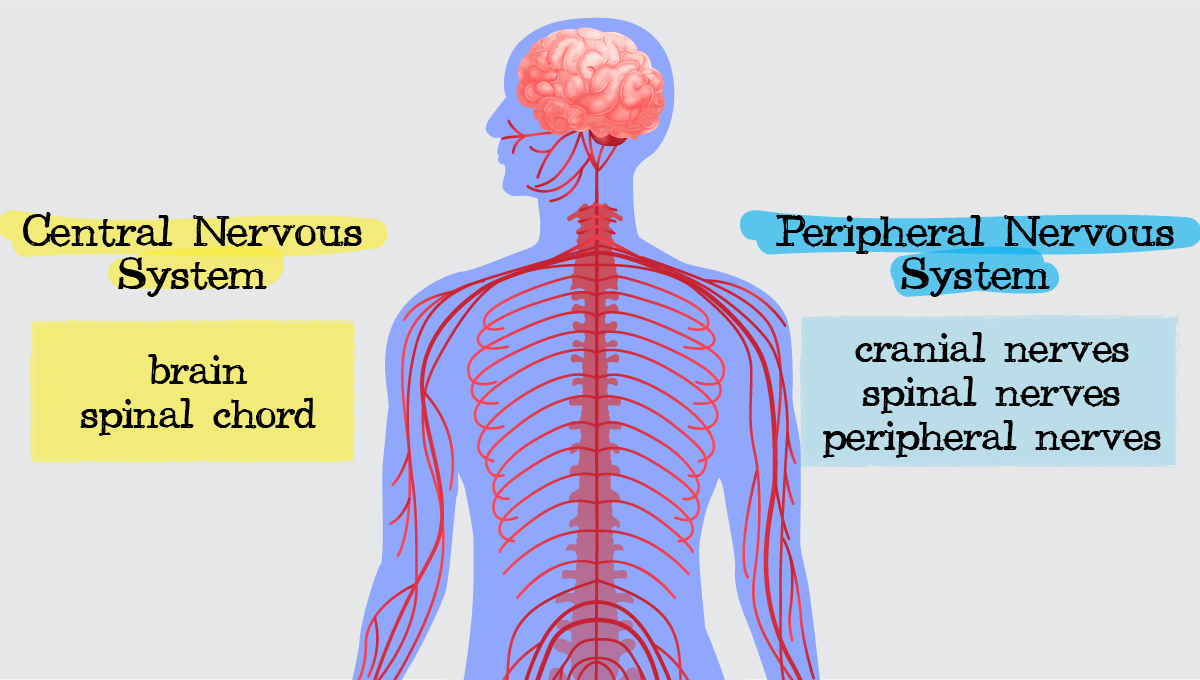
Just like a computer, the brain captures information through the eyes, ears, nose, tongue, and skin (as well as from internal organs) and then interprets and processes the information which then travels through the spinal cord, acting as a highway for this information exchange to happen.
Main Location Of CB1 and CB2 Receptors
| Receptor | Location |
|---|---|
| CB1 | Brain and throughout the body |
| CB2 | Immune and gastrointestinal system |
This “highway” is surrounded by cannabinoid receptors known as CB1 and CB2 which cannabinoids bind to when you consume them, so if you've ever consumed cannabis before you certainly experienced this... but do you know why you experience those effects?
2. The Effects Of Cannabinoids On CNS Function
As mentioned, the central nervous system controls our movement, thoughts, and a lot more, being basically responsible for sending information from the brain to the nerves and vice-versa. And, as you may know, cannabinoids are absorbed by receptors and can affect your CNS, but how?
Psychomotor Control
Cannabinoid receptors are mainly concentrated in the basal ganglia and cerebellum, this is why cannabinoids have an effect on our psychomotor functions. One of the first studies conducted with cannabis on test animals described that low doses of THC (around 0.2mg/kg) decreased locomotor activity but higher doses (1-2 mg/kg) actually stimulated movement, and even higher doses (2.5mg/kg) caused sleep.
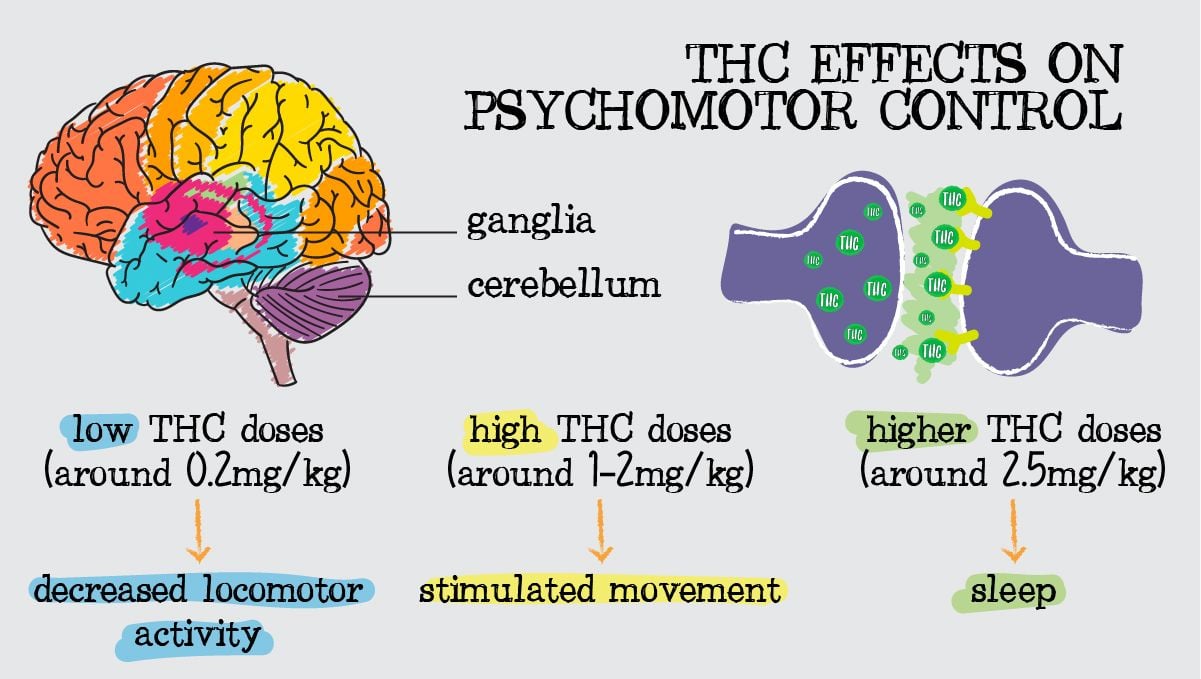
These effects are also seen in humans. Cannabis can also cause impaired psychomotor control and, in high doses, a person may remain immobile for a long time and seek isolation.
Cannabinoids Effects On Memory
One of the known effects of cannabinoid consumption in humans is an impairment of short-term memory, also, several studies have shown that test patients had trouble performing tasks that depended heavily on attention.
Scientists suggest that these effects occur in the hippocampus (a complex brain structure with a major role in learning and memory) due to disruptions of the information in hippocampal circuits and this happens because cannabinoid receptors are especially abundant in the hippocampus.
Effects Of Cannabinoids On Appetite
Several studies report that cannabis use is most commonly associated with increased appetite, even if the person is fully satisfied; In studies, THC showed to have significant effects in counteracting the loss of appetite and loss of weight in those suffering from AIDS, suggesting that cannabinoids may affect food intake and body weight due to mediating the appetite-suppressant effects of leptin (a hormone that helps to regulate energy balance by inhibiting hunger).
Cannabinoids And Nausea
Not only natural cannabinoids such as THC but also synthetic cannabinoids have the ability to control nausea and vomiting, showing good results with cancer patients going through chemotherapy among other uses but due to the narrow window between the antiemetic effect and the psychoactive effects, it has been difficult to use with most patients.
Cannabinoids Effects On Brain Functions
Just like other intoxicating substances, cannabinoids can cause profound changes in different brain functions because the hippocampus contains a high concentration of CB1 receptors. Several studies have reported that users sometimes present synesthesia (a neurological condition in which information meant to stimulate one of your senses stimulates several of your senses) but this effect is not always present, this is why most studies have inconclusive results.
On the other hand, one effect that has been confirmed several times is the sensation of time passing more quickly (although it may give the sensation of time passing more slowly to some). This effect can also be seen in animals and despite impairing cognitive function, researchers have concluded that the effects are light when compared to other substances such as alcohol.
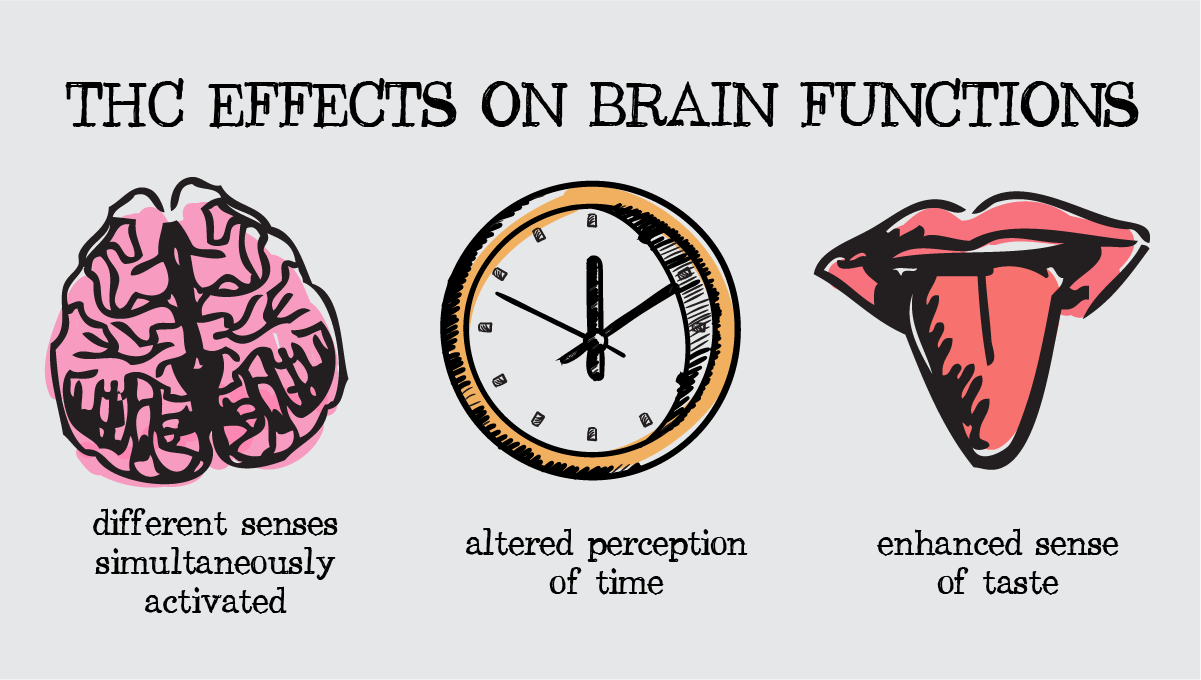
More recent studies suggested that these effects are often more easily found on heavy cannabis users but the results did not show significant differences between long-term heavy users, moderate users, and non-users.
However, it is acknowledged that there indeed are impairments in cognitive tasks when using cannabis although there’s no evidence on exactly why this happens, but it’s believed that these effects are associated with long-term use but regular users can experience small impairments in cognitive function even after stopping consumption.
Cannabinoids And Pain
Cannabinoid receptors are found along pain pathways, from sensory nerves to the spinal cord and this is why one of the main therapeutic benefits of cannabis is pain relief. Studies have shown that cannabinoids suppress responses of neurons to harmful stimulations, this means that cannabinoids can relieve inflammatory pain, and some studies have shown that cannabinoids can also reduce symptoms of nerve-related conditions. Results show that not all pain-relief effects are moderated via the cannabinoid receptors, it’s possible that the analgesic effects are partially moderated through other still unknown receptors.
There’s still more research about cannabinoids to be made in order to reach conclusions however, progress has been slow due to the laws and regulations regarding cannabis. Despite the benefits, cannabinoids can also have dangerous effects which can vary according to inter and intra-individual variability.
3. Dangerous Effects Of Cannabis On The CNS
As mentioned, cannabis can also present harmful effects depending on several factors that range from age and weight to exposure to chemicals and pre-existing diseases. There isn’t much research about the adverse effects of cannabis due to the prohibition in most countries but the most common ones are the following.
Chronic Use May Damage the Brain
There is very little evidence to support the claims that cannabis can permanently damage the brain, cannabinoids can indeed impair the ability to focus and reduce your attention span but several studies have failed to find clear evidence of brain damage.
A study comparing adult cannabis users found no evidence of atrophy or changes in tissue volumes, the mixed reports of the effects of cannabinoids on the brain are confusing and although it’s possible to demonstrate neurotoxicity after consuming a high dose of cannabinoids, there’s no evidence for significant damage.
Cannabis And Psychiatric Illnesses
Large doses of cannabinoids can trigger temporary psychosis in some consumers, known as “cannabis psychosis”, this almost always results from the abuse of cannabis-infused drinks and edibles and usually persists until the cannabinoids are eliminated naturally.
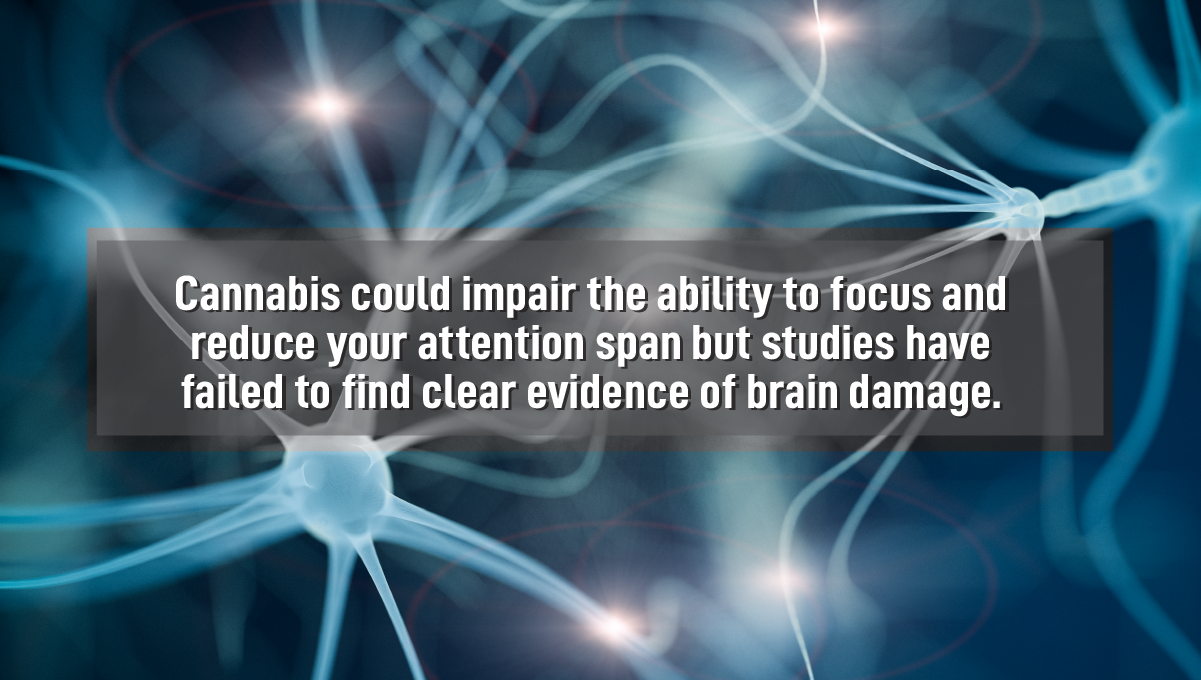
Sometimes, the cannabis psychosis can be sufficiently strong to result in hospital admission and the diagnosis is usually confused with schizophrenia due to the symptoms being somewhat similar, these symptoms include:
- Delusions of control;
- Persecution;
- Auditory hallucinations;
- And Blunting of emotions.
Not all patients will present all the symptoms and it may be possible that some patients present unusual symptoms but in all cases, there is a big similarity to schizophrenia, leading to the hypothesis that these symptoms may be caused by abnormal activity of the cannabinoid mechanisms in the brain.
Despite the multiple cases, the relation between cannabis use and psychotic illnesses is still unproven, on the other hand, scientists say it’s clear that cannabis can aggravate the symptoms of pre-existing psychotic illnesses, and it’s not 100% clear yet if medicating with cannabis can be used to treat this type of illness, although a couple of recent studies have shown promising results nevertheless, the use of cannabis to treat psychotic illnesses is discouraged.
4. In Conclusion
The discovery of cannabinoids and the endocannabinoid system has restored cannabis research in the past years, reaching the conclusion that not only THC but other cannabinoids can be used as a way to regulate neurotransmitter release. Nevertheless, the desired therapeutic benefits come along with sometimes unwanted side-effects, making its use not fit for all patients.
Medical Disclaimer
This content is for educational purposes only. The information provided is derived from research gathered from external sources.
External References
- Harmful Effects of Smoking Cannabis: A Cerebrovascular and Neurological Perspective. - Sabrina Rahman Archie and Luca Cucullo.
- Cannabis: Effects in the Central Nervous System. - Víctor Manuel Rivera-Olmos and Marisela C Parra-Bernal.
- How does marijuana produce its effects? - National Institute on Drug Abuse












Comments